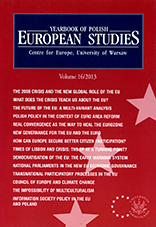In Times of Lisbon and Crisis: The European Parliament at a Turning Point?
In Times of Lisbon and Crisis: The European Parliament at a Turning Point?
Author(s): Paweł KaletaSubject(s): Politics / Political Sciences
Published by: Centrum Europejskie Uniwersytetu Warszawskiego
Summary/Abstract: Both the Treaty of Lisbon and the global economic crisis have had a significant impact on the European Parliament (EP) – the only directly-elected institution of the European Union (EU). However, the oft-asserted broadening of the EP’s powers under the Lisbon Treaty needs to be critically examined. An analysis of the EU budget adoption procedure might lead to a conclusion that these powers have actually been limited. Examples of policies like cohesion show, in turn, that even where the European Parliament has acquired greater legislative influence, this rests mainly on its ability to delete or dilute provisions already present in the European Commission proposal. Moreover, new formulations on key issues proposed by the EP are usually already known to form part of the Council position. Further research and possible future evolution notwithstanding, in these times of crisis – when the voice of the people, whom the European Parliament represents, is in a particular need to be heard – the EP may still best be described as a ‘negative legislator’.
Journal: Yearbook of Polish European Studies
- Issue Year: 2013
- Issue No: 16
- Page Range: 153-166
- Page Count: 14
- Language: English

